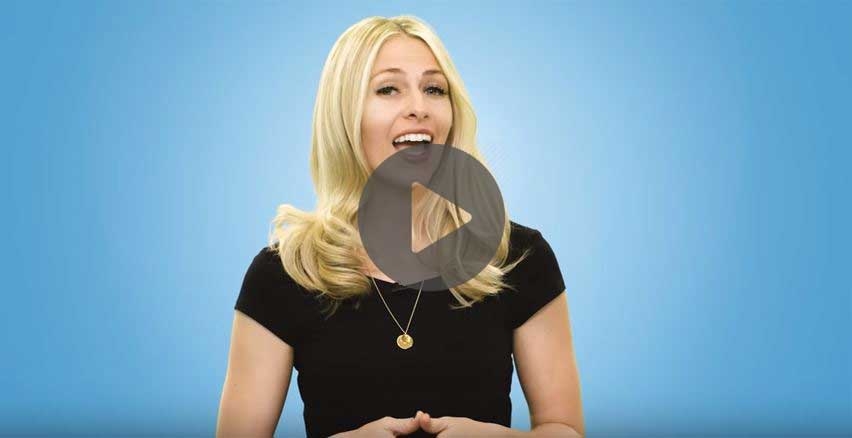What Should You Be Using In Your Skin Care Routine?
Take my quiz and get personalized recommendations from a
licensed esthetician!
9 DIY Treatments for Hair Loss That You Can Do At Home

It’s always gut-wrenching when you check the hairbrush and see all the hair that came loose, or worse yet, checking the drain after a long shower.
So many of us are paranoid about our hair thinning and falling out, but worrying only makes it worse!
It’s normal to lose anywhere from 50 to 100 strands of hair per day, but it does seem like quite a lot, considering hair only grows about 1 cm within a month.
Luckily, to help put your nerves to rest, there are many different natural ways to prevent hair loss using the ingredients you already have at home!
What Causes Hair Loss
Scary as it may seem, hair loss is extremely common!
About fifty percent of women in their fifties experience significant hair thinning and loss, but it can start as early as in your twenties and thirties.
Men also experience hair loss in the form of “male pattern baldness”; by the age of thirty-five, two-thirds of American men will experience some degree of hair loss, and by the age of fifty, approximately 85% of men have significantly thinning hair.
Despite what you may have heard, the tip to control hair fall and determine future hair loss can’t be done just by looking at how much hair your mother’s father had.
Men’s hair loss typically starts with a receding hairline and overall hair thinning at the crown of the head.
For men, hair loss can be traced primarily to one thing - your sensitivity to dihydrotestosterone (known as DHT, which is the hormone created by the body’s testosterone).
Just by taking a swab of saliva, DNA tests can determine your DHT sensitivity and show you your odds for balding and how you’ll react to specific types of hair loss medications.
For women, getting to the root cause of hair loss is much more difficult.
Collagen is the most abundant protein in your body and is vital to the health and growth of your hair, as well as many other things to keep your body functioning at 100%.
As you age, your body produces less and less collagen which can make the skin and scalp thinner and hair follicles more brittle.
There are many things that can cause hair loss in women, but many result in less-than-adequate levels of collagen.
Some general tips to control hair loss can be found by first understanding the causes of hair loss and how to avoid certain risk factors.
Hair loss and fall out can often be boiled down to any one or more of the following causes:
- Age: Hair loss is a natural part of life that occurs more and more as we age!
- Family history (heredity): Family history is the biggest indicator of hair loss patterns.
- Hormonal changes: Hormonal changes due to pregnancy, childbirth, menopause and thyroid problems can all cause varying degrees of hair loss. Many women also experience postpartum hair loss.
- Medical conditions: Lupus, diabetes, thyroid diseases, and alopecia areata are common medical conditions that cause the hair to fall out.
- Medications: Hair loss can be a side effect of certain drugs, such as those used for cancer, arthritis, depression, heart problems, gout, and high blood pressure.
- Poor nutrition: Diet and sleep are the keys to living a healthy life as well as retaining hair thickness. A diet insufficient in vitamins and minerals such as iron, copper, vitamin D, zinc, and proteins can as well as sudden weight loss due to poor nutrition, can trigger hair loss.
- Radiation therapy: This results in temporary hair loss but could also affect how your hair grows in the future.
- Stress: Stress causes temporary hair loss and general thinning of the hair after experiencing significant physical or emotional stress.
- Hairstyles and heat damage: Hairstyles that pull your hair tight can cause a type of hair loss called traction alopecia. Heat damage can also cause hair to fall out.
But fear not.
Below, we’ll share some tried and true natural hair loss remedies that you can whip up from home to treat hair loss.
But before that, let’s explore two traditional approaches to preventing hair loss that have less to do with ingredients and more to do with holistic healing.

Ayurvedic Cure for Hair Loss
Ayurveda is the centuries-old science of natural medicine that originated in India over 5000 years ago.
Ayurveda means the science of life (Ayur = life, Veda = science or knowledge).
It encompasses both science and philosophy and takes a holistic approach to healing the body and treating afflictions.
Ayurveda categorizes the human body into three categories derived from the elements: Vata (Ether and Air), Pitta (Fire and Water) and Kapha (Earth and Water).
Ayurveda uses the same natural ingredients and approaches that have been used for centuries to heal the body’s ailments.
When it comes to hair loss, Ayurveda attributes it to an excess of pitta, which causes the body to overheat and the hair to fall out.
The goal of treating hair loss is to balance pitta and cool the body down with natural remedies and diet.
For instance, to stop hair from falling out in excess:
- Wash the hair with cold water and massage with coconut oil, amla oil, aloe vera, or brahmi oil to cool the scalp and stimulate the hair follicles
- Avoid going out during the hottest parts of the day
- Avoid stress, which aggravates pitta
- Increase your intake of fresh vegetables and fruits
- Eat “cool” foods that contain cooling spices such as cumin, coriander, fennel, mint, cilantro, parsley, and turmeric rather than spicy foods
- Relax by practicing yoga and meditating on coolness and healing

Traditional Chinese Hair Loss Treatment
Another natural and effective hair loss treatment was developed using Traditional Chinese Medicine.
Traditional Chinese Medicine, or TCM, is based on the ancient principles of creating harmony and balance within the body and restoring Qi.
TCM also approaches healing holistically and believes that the body is not solely defined by the organs and systems it carries, but also as the home of the mind and spirit; it focuses on how the parts of the mind, spirit, and body affect the functions of other parts of the holistic “body”.
Generally, in the case of the scalp and hair, TCM dictates that your hair and scalp’s health is directly dependent on the health of your liver and kidney.
If they are stressed or unhealthy, it can decrease blood flow to the head, causing the hair to fall out and turn gray.
Chinese herbs have been used for centuries to treat various ailments and have been proven to be effective over time.
To balance your Qi, heal the scalp, and prevent further hair loss:
- Massage the scalp with an herb called He Shou Wu. This herb has a restorative property essential to the kidney and blood and has been found to stimulate hair growth.
- Massage the scalp with ginseng, which stimulates blood circulation and promotes cell metabolism.

9 Natural DIY Hair Loss Treatments
Like Ayurveda and TCM’s approaches to treating hair loss, we believe that the best remedies for hair loss are the ones that can be done at home, using simple, clean, natural ingredients.
For any of the below anti hair loss remedies, remember to massage the ingredients into the scalp.
Massage stimulates the scalp and can also reduce stress, one of the leading causes of hair loss.
1) Aloe vera
Aloe vera works wonders for the skin and hair and has been used in skincare routines for centuries.
Aloe can soothe the scalp and clean the hair of excess oils without stripping it.
Aloe is antibacterial and anti-inflammatory.
It can also be used to treat dandruff and skin conditions such as alopecia that may cause inflammation and small wounds on the scalp.
Aloe is most effective when harvested straight from the plant, but pure aloe vera gels or shampoos containing aloe can also be used to prevent hair loss.
You can apply pure aloe vera gel directly to your scalp and hair a few times per week or do your own aloe vera hair loss treatment by following the recipe below:
- 1. If using fresh aloe vera from the plant, take the stalk of aloe vera and extract the pulp.
- 2. Apply about ½ cup to your hair and massage into the scalp. Leave it for about 45 minutes.
- 3. Rinse! You can do this three to four times a week to see better results.
2) Coconut oil
Coconut oil contains fatty acids that penetrate the hair shaft and reduce protein loss from hair.
Coconut oil hair masks are easy to customize (like adding one of the below ingredients in this list) to make your own best home remedy for hair loss.
Here’s a basic frame of a recipe that will help keep your hair healthy and strong to fight hair loss:
- 1. Use a spray bottle to wet your hair.
- 2. Then, apply the warm (not hot) coconut oil evenly over your damp hair.
- 3. Apply more coconut oil to the driest sections of your hair, typically the ends, and less on the healthier parts of your hair, typically near the scalp, to avoid making the hair greasy.
- 4. Once you’ve coated all your hair, place a shower cap over your head and let the mask sit for 1 to 2 hours or overnight for severely dry hair.
- 5. Rinse out with lukewarm water and shampoo and condition as normal.
3) Onion Juice
We know this one might sound a little scary, but if you can handle the smell of onion, it’s well worth trying an onion treatment for hair loss.
Onion juice has been shown to promote hair growth!
Onions’ sulfur content helps to increase blood circulation in the scalp and promote collagen growth to keep your skin and hair healthy.
Onions also have antibacterial properties that treat scalp infections and dandruff.
- 1. To extract onion juice, simply throw peeled onions in the blender then squeeze the juice out using cheesecloth.
- 2. Apply the juice to your scalp and hair and leave in for at least 15 minutes.
- 3. Shampoo and condition as normal. Repeat throughout the week to see results quicker!
4) Castor oil
Many people use castor oil for hair loss treatment to grow a longer, healthier, thicker head of hair!
Though there are not many studies that have been done to concretely prove its effectiveness, the ricinoleic acid in castor oil can help to lock in moisture and keep your scalp hydrated and healthy which is essential to hair growth and many rave over its benefits.
Just apply from root to tip and cover with a shower cap. After you let it sit for an hour or two, you’re done!
Just make sure to use a gentle shampoo to remove the excess.
5) Fenugreek
Fenugreek seeds can be used to cure hair fall, hair thinning, baldness, and dandruff.
Fenugreek seeds are a rich source of iron and protein and contain flavonoids and saponins, which are anti-inflammatory, anti-fungal, and may induce hair growth.
Fenugreek can be taken orally with supplements or applied topically like you would with any other hair oil for your own DIY fenugreek hair loss treatment.
6) Rosemary oil
Rosemary has strong antiseptic properties that help treat the scalp.
When the essential oil is applied to the scalp, it has potent and proven abilities to stimulate hair growth!
However, because it is so potent, it needs to be diluted before being applied to the scalp.
- 1. Add two to four drops of rosemary essential oil in two tablespoons of warm coconut oil.
- 2. After that, massage the oil on your scalp for about ten minutes working through the roots to the tips and cover with a shower cap for 30 minutes.
- 3. Remove the shower cap, wash your hair and repeat two times a week for hair growth.
7) Apple cider vinegar
Hair loss can also be caused when the hair follicles become clogged due to excess oil and product buildup.
This then causes bacteria to build up and the hair to fall out. To clean the scalp and remove buildup and restore your scalp’s pH, try this apple cider vinegar rinse:
- 1. Wash hair with shampoo and conditioner.
- 2. Mix a couple of tablespoons of apple cider vinegar with water.
- 3. Pour over the hair, focusing on the scalp, and massage.
- 4. Rinse
8) Egg
Yes, the humble egg has now earned its place as a natural cure for hair loss!
Eggs have a high level of protein, which promotes hair regrowth.
It also contains growth-promoting vitamins like biotin, folate, vitamin A, and vitamin D, which are naturally found in healthy hair.
You can apply egg yolks directly to the scalp as a deep conditioning treatment or add a little coconut oil with your egg to help it spread. After about an hour, rinse with cold water (please don’t cook it) and wash.
9) Olive Oil
Last but not least, olive oil is a great ally to healthy skin and hair growth!
Make sure you reach for pure virgin olive oil with no additives.
The amount you use depends on if you want to apply just to the scalp or also to the shaft of the hair.
Just heat it up, apply, let it sit for 30 mins, rinse, wash, and presto - you’re on your way to a thick, healthy mane!
3 comments
Good informative blog, natural hair shampoo provides a better treatment for hair related issues.
Your blog is very nice. These tools are really very helpful…:-)
Thanks so much for impacting us with your knowledge and time you spend to do research we appreciate.
















